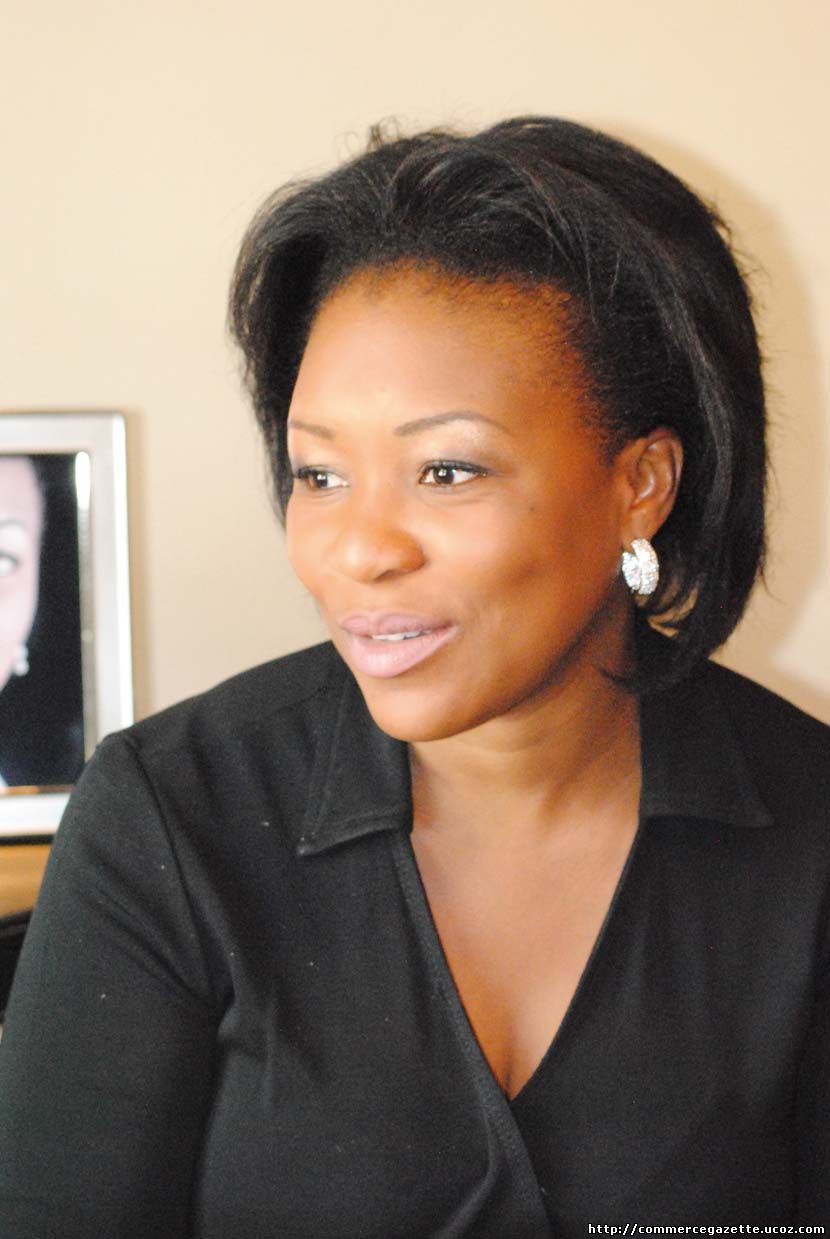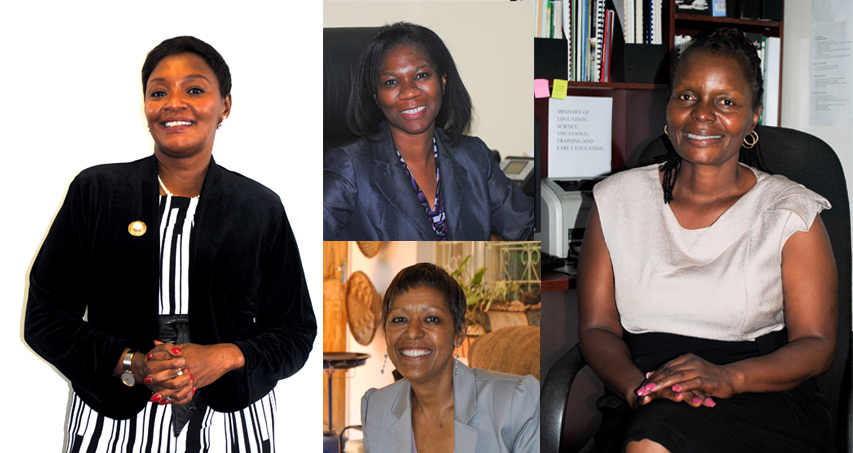 | Interestingly, Mutinta credits the first republican president Dr Kenneth Kaunda to formally introducing her to her husband. Through lineage and love Mutinta has found herself aligned to these prominent people and has learned to navigate through life’s challenges as best as she can.
She is a confident, charismatic, a straight speaker and a strikingly beautiful woman. She is a public figure who is the host of a television chat show ‘Talk it over with Chicco’ on Muvi TV.
In addition, Mutinta has chosen to continue her father’s business legacy and is running the firm ‘Duncan, Gilbey and Matheson (Z) Ltd’ were she heads the sales and marketing departments. Showing that the apple has not fallen far from the tree, Mutinta has founded her own company that specializes in the manufacturing and distribution of her women’s cosmetic line, Color Evolution.
Growing up
Mutinta recalls her
relationship with her father describing him as ‘jovial, full of life and
energy’. She says, ‘…He was a very good friend of mine as well as a
father’.
She continues, ‘We grew up in an environment that
allowed us to pursue our own individual goals, with my parents
guidance. My father and mother worked to mold us into what we felt was
important to us as individuals but also what they felt they could get of
us as parents. My father was a strict, no nonsense type of person but
he was also lighthearted and easy going. There was never a dull moment
when he was at home.’
Mutinta is the second born in a family of four, she has two sisters and her brother is the youngest of her siblings. | Recalling Pain
The experience of losing her father, Anderson Mazoka, has left an indelible mark on her. She recalls the day he died as strange, a day she woke up feeling terribly low and crying for no apparent reason.
Later that day Mutinta would learn why she had felt melancholy; her phone rang and it was her younger sister Chichi crying on the other end. In that instance her worst fears were realized as her sister told her, their father had passed away.
‘I just broke down. It was a pain that I have never felt before. It was literally like somebody had stubbed a knife through my heart.’
Mutinta recounts the funeral was a public and political affair, with a huge and unrestrained outpouring of grief from the people who came. However, because she was confined to the privacy of their home during the wake, she was unaware of the political scuffles and juggling that was going on. Later she was surprised and saddened to hear about them.
Despite his public life Mutinta is happy with the decision that was made to bury her Dad on their family farm, where she feels he rests in peace, having given his life to public service during his lifetime.
Life’s Lessons
The tribulations her father went through as a politician have had a direct bearing on any desire she might have had to enter politics. Mutinta still carries the pain of seeing her father’s health deteriorate and knowing the circumstances that led to his illness.
She reflects that, ‘I just felt that if in politics we go to an extent of wanting to kill each other…then I don’t know if this is a game I would want to play. They found arsenic in his body. He is not the first and probably he won’t be the last to meet with fate in such manner. For me, I feel that to serve one’s country we should not have to fight each other. It is better to work cooperatively with one another. People have to know what service is.’
Mutinta says Africa and Zambia are faced with a conundrum because government is the center of growth where wealth rotates. This has resulted in everybody being magnetized towards government, causing people to fighting for a share of the resources rather than allowing those resource to trickle down to the people.
Mutinta strongly feels that the best answer to changing these self-serving attitudes in politics is ‘education’. She adds; ‘People need to understand what’s at stake when they vote. The should ensure they have representative that will truly serve them’.
Mutinta says she does not subscribe to the hand picking of a successor in political parties because that is not democracy. ‘I feel that as a good leader, you should be able to groom a crop of people who would then identify amongst themselves who is best to lead that vision, or who is best to create a better vision for that particular party. A vision, she emphasizes, is not created by one person. It should be a product of minds coming together.’
Mutinta says many observers and close associates of her father have confirmed that in both business and politics, her father always groomed younger people for leadership. She says they are many people that today affirm that they were mentored by the late Mazoka and that he somehow contributed to their success and subsequent achievements in life; ‘…they are where they are because of his guidance,’ she says with a smile.
Academia and professional pursuits
Mutinta left her Zambia to study at Syracuse University in the state of New York in the USA. She attained her degree in political science and after graduation, she recalls that the New York weather which she had endured for three years became too cold for her. So in seeking a change of environment, she took a year’s sojourne before pursuing her masters and traveled down south to Washington DC.
In Washington DC she found employment with the National Democratic Institute for International Affairs (NDI), a nonprofit organization working to strengthen democracy worldwide. The organisation provides assistance to civic and political leaders advancing democratic values, practices and institutions. After a couple of years with NDI, Mutinta moved west to Atlanta to pursue her masters. She graduated with an MBA with a bias towards financial management.
She recalls how she would joke with her father that he had beaten her at the game of politics and that therefore she had decided against pursuing a political career.
‘I got a job with American Express as a financial advisor and was in the process of writing my series seven, a prerequisite to getting a financial license that would allow me to trade as a financial adviser.’
While at her home watching television she witnessed the coordinated terrorist attacks launched on the twin towers on September 11, 2001. This action had a pivotal role in changing her career direction, as the bombing had a big impact on the global and financial markets. Those impacts were both immediate and long-term, since some of them are still being felt to this day. The attacks caused the Dow Jones Index to drop more than 600 points and caused the 2001 recession to deepen. As a result of the negative economic impacts on the financial markets, traders were facing eminent lay-offs and within a year of joining American Express, Mutinta left in pursuit of a different career.
Activism and social conscious
Feeling ready for a more fulfilling job, Mutinta found it with an agency called ANIZ, a non-profit organization based in Atlanta. It provides comprehensive health awareness, education and prevention services to women and children, through therapeutic intervention and education for those who are infected or affected with HIV/AIDS.
Mutinta ranks her time at ANIZ among her top three life experiences because believes she impacted people’s lives positively and was able to see the result of her work on people’s faces, unlike the corporate world where the impact of advocacy work is seen through the bottom line on the company balance sheets.
Working as programme director at ANIZ, Mutinta assisted in drawing up a nine-week programme called Reaching Out To Sisters With HIV/AIDS (ROSHA) specifically tailored to women of colour and promotes self-advocacy, voluntary disclosure and participation in civic engagement to remove stigma. What she found most moving about this experience was how it impacts children and empowered the women.
During her tenure with the organisation, the executive director of ANIZ came to Zambia and formed an alliance with Tasinta to try replicating some programs in Zambia. Despite having returned to Zambia some years ago, Mutinta has kept in touch with her collegues at ANIZ were she worked for 3 years.
Commenting on Zambia’s HIV/AIDS profile, Mutinta says ‘stigma is nowhere near to what it was before, because medication has lessened the symptoms and allowed people to live longer. However, she maintains that the disease has not changed people’s lifestyle.
Keeping the legacy – creating Zambian brands
Although Mutinta certainly could have had a future in politics, she never entered the political arena, choosing instead to make her own way in the world – working in media and in business.
She says, ‘I know if my father were alive today, he would be proud of the progress we have made with the business. We’re working to full capacity, we have about just under a hundred part time and full time employees.’
In 2007 she began reviving her family’s liquor manufacturing industry, turning it into one of the top companies in the sector.
‘We’ve got brands that are very traditional in Zambia in terms of the memories that people have. We blend, package and distribute all locally made products. Our brands include Afrikoko, Lavelle, Mark Royal whisky (which is our number one selling product) and we have quite a number of other products.’
Discussing the concept behind her talk show Mutinta says, ‘everybody has got a story to tell. Most times people don’t have a way to communicate to each other particularly on issues where they hold strong personal beliefs’. To overcome these challenges Mutinta wanted to provide a television platform for open discussion to bring people closer together and unlock their biases.
‘I thought to myself, why not create a program in Zambia that would allow people to have this conversation about so-called taboo subjects on things that people would typically not talk about, that’s how I came up with the television show.’
She continues, ‘What I found interesting about the program is that I felt that it gave people an opportunity to speak. I have issues with judgment. I feel that as human beings that is probably our greatest challenge. We have a tendency to judge a lot before we endeavour to knowing a person or understand the issues.’
Mutinta’s venture into television is not her first. While living in the US she co-hosted a television show African Treasures. The show showcased Africans living in the diaspora, and highlighted African culture, arts and music.
Her experience from working on television taught her about makeup and led her to her latest enterprise; the manufacturing and distribution of cosmetics. Her cosmetic line, ‘Color Evolution’, is 100% natural-based makeup launched in 2005.
Mutinta’s personal philosophy in life espouses to the ‘Pay-It-Forward’ thinking, where an individual makes a positive difference in this world by rending simple acts of kindness and assistance to another thereby creating a sense of luck and good that will change the world. Acts of kindness shown cannot always be repaid and the greatest acknowledgement of this assistance rendered is for the recipient to pay-it–forward and assist others.
This philosophy was started by a young writer Catherine Ryan Hyde, and the idea popularized by her book of the same title, which was later made into a movie, and has been embraced by many people the world over.
|
|



